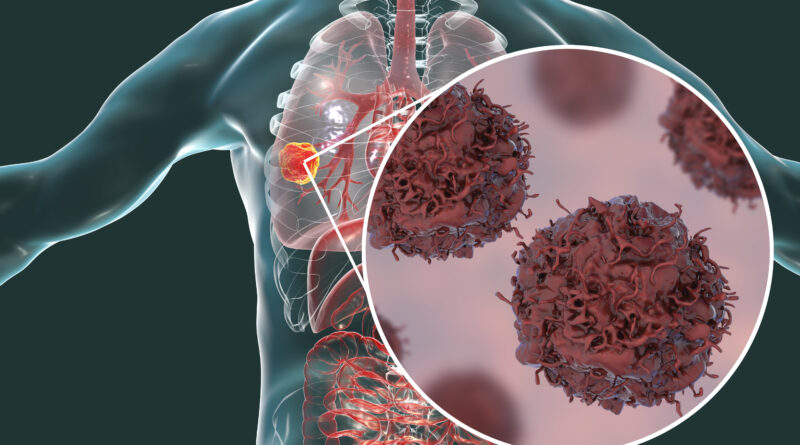Dual immunotherapy plus chemotherapy helps patients with lung cancer
Researchers from the University of Texas MD Anderson Cancer Center have shown that patients with metastatic non-squamous non-small cell lung cancer (NSCLC) with certain mutations in STK11 and/or KEAP1 tumor suppressor genes may benefit from including immunotherapy. tremelimumab in combination with durvalumab plus chemotherapy to overcome the resistance to treatment often seen in these patients.
The study results, published today in Nature, identify KEAP1 and STK11 as potential biomarkers to stratify patients who may benefit from the addition of CTLA-4 immune checkpoint inhibitors, including tremelimumab.
In these patients, adding tremelimumab to durvalumab and chemotherapy resulted in higher response rates (42.9%) than patients who received durvalumab plus chemotherapy (30.2%) or chemotherapy alone (28%). These findings were further confirmed in preclinical models, supporting the use of dual inhibitors for patients with these mutations.
“STK11 and KEAP1 mutations are common in NSCLC patients and are associated with poor clinical outcomes with current front-line therapies,” said co-author Ferdinandos Skoulidis, MD, Ph.D. ., assistant professor of Thoracic. / Head and Neck Medical Oncology “Although early research has suggested potential benefits from adding CTLA-4 inhibitors to PD-1 or PD-L1 inhibitors, we have not -reliable biomarkers to predict which patients will see the best outcomes. This study provides the strongest evidence to date for STK11- and/or KEAP1-mutated patients NSCLC may selectively benefit from immune checkpoint blockade.
This research study – made possible by a collaboration between 22 academic institutions in North America and Europe as well as biotechnology and pharmaceutical companies – combines clinical group analyses, patient samples, laboratory samples and data. from the Phase III POSEIDON clinical trial.
A preliminary observation in a cohort of 871 patients with NSCLC showed that patients with STK11 and/or KEAP1 mutations had poorer outcomes with chemotherapy plus the PD-1 inhibitor pembrolizumab. The researchers went on to study the immune and genetic patterns of 8,592 non-squamous NSCLC tumors. They found that mutations in the STK11 and KEAP1 genes were linked to the tumor’s unfavorable environment, often referred to as a “cold” environment. This type of environment had more myeloid suppressor cells and fewer CD8+ cytotoxic T cells, which are important for fighting tumors. However, they noted that CD4+ immune cells were less affected and remained present in tumors with STK11 and/or KEAP1 mutations.
Based on these observations, the researchers hypothesized that two inhibitors targeting CTLA-4 in addition to PD-1 or PD-L1, could improve the outcome. In a study of 1,013 patients from the POSEIDON study, researchers confirmed tremelimumab in combination with durvalumab and chemotherapy improved response rates, progression-free survival and overall survival.
To further expand these findings, the experts examined the effects of one and two immune blocks on the tumor microenvironment in several preclinical models of STK11 and/or KEAP1-mutated NSCLC. Compared to PD-1 inhibition alone, dual checkpoint inhibition significantly improved the tumor microenvironment by increasing the presence of specific immune cells that enhance the antitumor response, providing a mechanism that may explain the benefits of observed.
“These findings support that NSCLC patients with STK11 or KEAP1 mutations are resistant to conventional combinations of PD-(L)1 inhibitors and chemotherapy, but may benefit greatly when a CTLA-4 inhibitor is added to their regimen of treatment,” said co-lead author John Heymach, MD, Ph.D., chairman of Thoracic/Head and Neck Medical Oncology. “We hope that these results will lead doctors to consider this new treatment as the preferred treatment option.”
The limitations of this study include the fact that some of the results were analyzed after the study was completed, as well as the limited number of patients with STK11 and / or KEAP1 mutations. In the ongoing Phase IIIB TRITON trial, investigators will compare dual-site prophylaxis with durvalumab and tremelimumab versus pembrolizumab plus chemotherapy in patients with advanced non-squamous NSCLC with mutations STK11, KEAP1 or KRAS.
This research was supported by the National Institutes of Health/National Cancer Institute (P50 CA070907, 1R01 CA262469-01, 1R01 CA279452-01A1, R01 CA205150, CA016672, 1S10OD024977-016 P31, CA016 P306 P306, CA016 P3016 P316 08748), Cancer Prevention and Research Institute of Texas (RP160652), MD Anderson’s Lung Cancer Moon Shot®, Stand Up to Cancer, The Mark Foundation for Cancer Research, The Gordon A. Cain Foundation, Gunnigar Fund, Andrea Mugnaini Lung Cancer Research Fund, Ford Petrin Fund, Rexanna Foundation to Fight Lung Cancer, and David Bruton, Jr. Chair endowment.
A complete list of acknowledgments, corresponding authors and their disclosures can be found here.
#Dual #immunotherapy #chemotherapy #helps #patients #lung #cancer
